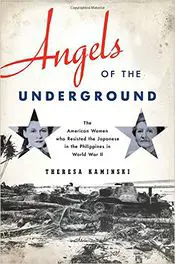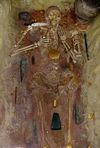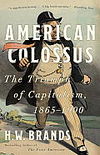Difference between revisions of "Main Page"
| Line 2: | Line 2: | ||
{{Mediawiki:Banner}} | {{Mediawiki:Banner}} | ||
<div class="portal" style="width:85%;"> | <div class="portal" style="width:85%;"> | ||
| − | [[File: | + | [[File: Angels_of_the_Underground_.jpg|thumbnail|left|175px]] |
| − | ==[[ | + | ==[[Angels of the Underground: Interview with Theresa Kaminski]]== |
| − | + | The Oxford University Press recently published Theresa Kaminski's Angels of the Underground: The American Women who Resisted the Japanese in the Philippines in World War II. Kaminski's book follows the lives of four American women who were stranded in the Philippines after Japan invaded during World War II. Publishers Weekly described her book as a "fast-paced true story" that documents how these women resisted Japanese occupation. | |
| − | {{Read more| | + | {{Read more|Angels of the Underground: Interview with Theresa Kaminski}} |
</div> | </div> | ||
| Line 24: | Line 24: | ||
<div class="portal"> | <div class="portal"> | ||
| − | [[File: | + | [[File:Galenus.jpg|thumbnail|left|175px]] |
| − | ==[[ | + | ==[[What was the dominant medical sect in the United States during the 19th Century?]]== |
| − | + | Nineteenth-century medicine was characterized by constant competition among three major medical sects: Regulars, Eclectics, and Homeopaths.[1] Each of these medical sects not only meaningfully disagreed on how to treat illnesses and diseases, but sought to portray their type of practice as the most effective and scientific. Arguably none of the three sects was superior to the others, but their adherents concluded that their sectarian beliefs were better than their competitors. | |
| − | {{Read more| | + | {{Read more|What was the dominant medical sect in the United States during the 19th Century?}} |
</div> | </div> | ||
Revision as of 17:34, 8 April 2016
Angels of the Underground: Interview with Theresa Kaminski
The Oxford University Press recently published Theresa Kaminski's Angels of the Underground: The American Women who Resisted the Japanese in the Philippines in World War II. Kaminski's book follows the lives of four American women who were stranded in the Philippines after Japan invaded during World War II. Publishers Weekly described her book as a "fast-paced true story" that documents how these women resisted Japanese occupation. Read more...
How Did Gold Become Desired by Ancient Civilizations?
Gold is first known to have been acquired by ancient human societies in the 4th millennium BC, a time when copper and metals were beginning to be utilized more frequently. This suggests this is a period when pyrotechnologies improved, allowing metals to be developed more substantially. Read more...
Gilded Age/Progressive Era History Top Ten Booklist
Featured Booklist Creating a Top Ten List for the Gilded Age/Progressive Era is challenging. There are an extraordinary number of outstanding books on this period. These books are a selection of our favorites. Read more...
What was the dominant medical sect in the United States during the 19th Century?
Nineteenth-century medicine was characterized by constant competition among three major medical sects: Regulars, Eclectics, and Homeopaths.[1] Each of these medical sects not only meaningfully disagreed on how to treat illnesses and diseases, but sought to portray their type of practice as the most effective and scientific. Arguably none of the three sects was superior to the others, but their adherents concluded that their sectarian beliefs were better than their competitors. Read more...
How did Medicine develop in the Ancient World?
As the calendar flipped from June to July in 1863 Gettysburg, a small market town founded in the soft, rolling hills of south central Pennsylvania on Samuel Gettys farm half a century before, was unknown to most Americans. Four days later, on July 4, it had become "The Most Famous Small Town in America," as boosters would come to call it. Read more...
Causes of World War II Top Ten Booklist
The second world war was arguably the most catastrophic war in human history. The origins of the second world war in Europe are complex and controversial. The following article is a list of ten books that provide different perspectives on the root causes of the second world. Read more...
How Did the German Military Develop Blitzkrieg?
The early German victories in Poland, Norway, France, the Low Countries, the Balkans, North Africa, and Russia form an impressive list of military triumphs. What was more, these triumphs were accomplished with great speed and fairly modest cost to the Germans. Indeed, these victories were so striking that they gave rise to the myth of German military supremacy—a myth that has persisted to this day. Read more...
Interviews
These are our interviews with historians discussing their new books.
- Interview:Voodoo, Kidnapping and Race in New Orleans during Reconstruction: Interview with Michael A. Ross
- Interview:The History of Music Piracy: Interview with Alex Sayf Cummings
- Interview:The History of Doctors Without Borders: Interview with Renée Fox
- Interview:Re-evaluating the Albany Civil Rights Movement: Interview with Lee Formwalt
- Interview:Pigs, Parks, and Power in the Antebellum City: Interview with Catherine McNeur
- Interview:Lincoln's Biggest Bet: Interview with Todd Brewster
- Interview:African American Soldiers During the Civil War: Interview with Author Bob Luke
- Angels of the Underground: Interview with Theresa Kaminski
- The Conspiracy of Free Trade: Interview with Marc-William Palen
- Hodges' Scout: Interview with Len Travers
- Shantytown, USA: Interview with Lisa Goff
- Engineering Victory during the Civil War: Interview with Thomas F. Army, Jr.
- Thomas Jefferson, the Founding Fathers and Christianity: Interview with Sam Haselby
- The Alien and Sedition Acts of 1798: Interview with Terri Halperin
- Fate of the Revolution: Interview with Lorri Glover
- Privateering during the War of 1812: Interview with Faye M. Kert
- American Surveillance: Interview with Anthony Gregory
- Primed for Violence in Interwar Poland: Interview with Paul Brykczynski
- Inventing the Pinkertons: Interview with Paul O'Hara
- American Girls in Red Russia: Interview with Julia Mickenberg
- Make It Rain: Interview with Kristine C. Harper
- The Cold War, Sexuality, and American Medicine: Interview with Carolyn Herbst Lewis
- Nature's Path: Interview with Susan E. Cayleff
Booklists
Includes both Expert and User created Top Ten History Booklists.
- Top Ten Books on Napoleon Bonaparte
- Top Ten Books on Los Angeles History
- Top Ten Books on the History of Reconstruction
- Top Ten Books on the Bubonic Plague
- Top Ten Books on The Medici Family during the Renaissance
- Top Ten Books on Julius Caesar
- Top Ten Books from the Oxford Battle Series
- Top Ten Booklist on Joseph Stalin
- Great Gifts for History Lovers 2018
- Top Ten History of Voting Rights Booklist
- New Kingdom Ancient Egypt Top Ten Booklist
- Ancient Egypt’s Third Intermediate and Late Periods Top Ten Booklist
- Top Ten War Books that were turned into Movies
- Great Gifts for History Lovers 2017
- Ten Essential Books Pertaining to the Holocaust
Articles
Articles are wiki pages with history essays written by our experts and your contributions.
- Why did the United States start the Mexican American War
- What Caused The Economic Panic Of 1837
- Why did Andrew Jackson want to destroy the Bank of the United States
- Why did the United States begin directly electing Senators in 1913
- How did Mussolini Rise to Power as the Dictator of Italy
- Why did Germany lose the Battle of Stalingrad
- What were Joseph Stalin's goals as World War Two ended
- How historically accurate is the Gladiator
- How Historically Accurate is season 1 of Versailles
- What Role Did the Canaanites Play in the Bronze Age Near East
- What Are the Origins of the Germanic Tribes
- How did William the Conqueror and the Normans win at the Battle of Hastings in 1066
- How Did the God Baal Become Popular
- Who was Theseus the great Athenian king and hero
- What convinced Americans during the 1918 Flu Pandemic to wear masks
Categories
Below you can find the category structure of the wiki, as well as the pages within each category.
Contribute
DailyHistory.org is wiki where you can create and edit history articles. Every article answers a historical question and every booklist is a Top ten list. After you register, you will be able to edit and create articles. All of your contributions need to be original. If you want to create a new page, you can easily do so by using the following form:
Blog Roll
Here are some links to our Favorite History and Academic Publisher Blogs
- Tropics of Meta
- Nursing Clio
- The Junto
- Points: The Blog of the Alcohol and Drugs History Society
- Process: A Blog for American History
- Legal History Blog
- Balkinization
- Cooking in the Archives
- We're History
- Real Clear History
- History News Network
- National Museum of American History
- Oxford University Press Blog
- Johns Hopkins University Press Blog






